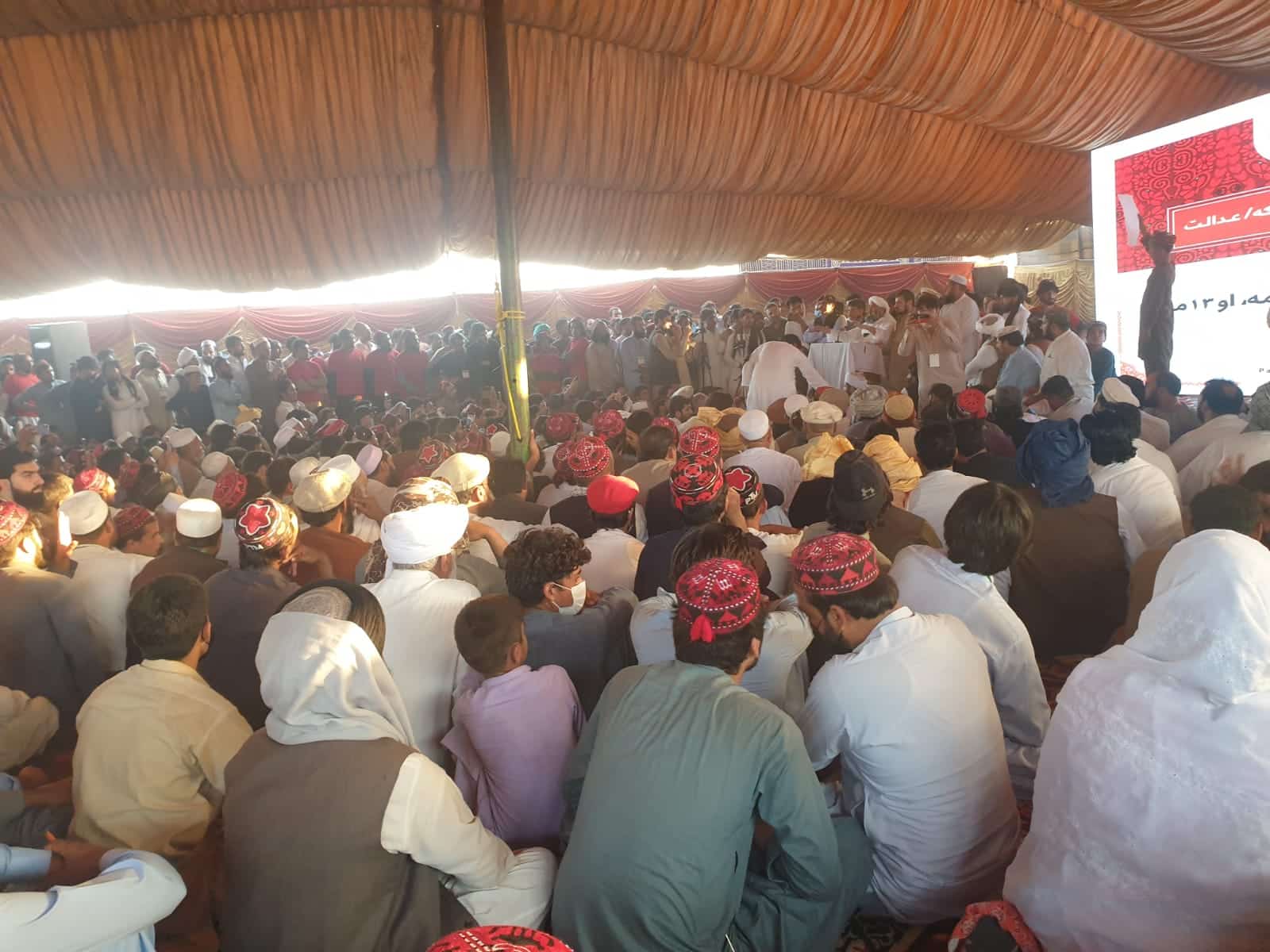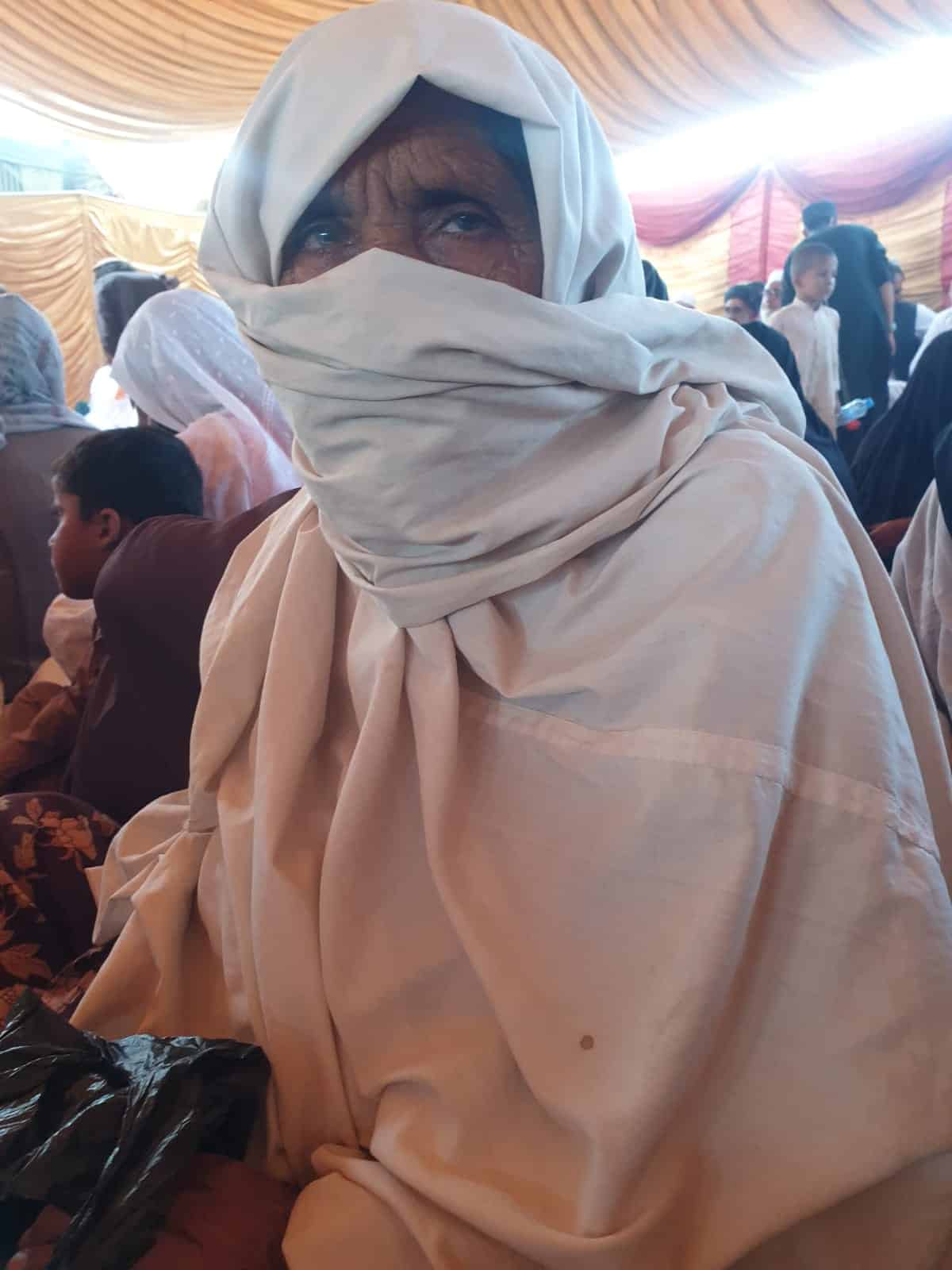“I just hope that both of my children are returned to their tribe,” says Masta Bibi, a partially blind Pashtun woman in her seventies. Originally from Mirali in North Waziristan, Pakistan, she is the mother of two missing sons: Bilal, who disappeared 11 years ago, and Ihtesham, who vanished two years ago. Her home was destroyed during a military operation targeting terrorist groups that sought refuge in the ex-FATA region after September 11, 2001. Despite her frailty, she attended the Pashtun Qaumi Jirga, held from October 11 to 13 in Jamrud, Khyber, with a lingering hope for justice.
Masta Bibi’s story is not unique. The Pashtun Qaumi Jirga, or Pashtun National Court, brought together many Pashtun women whose husbands, sons, brothers, and fathers remain unaccounted for.
A report submitted in January 2024 by the Commission of Inquiry on Enforced Disappearances to Pakistan’s Supreme Court lists 3,485 missing individuals from Khyber Pakhtunkhwa, including the merged ex-FATA region. However, data from the Pashtun Tahaffuz Movement (PTM) – a non-violent grassroots movement advocating for the rights of Pashtuns, Pakistan’s second-largest ethnic group – estimates 6,700 civilians have disappeared over the past two decades.
Ex-FATA: Ilaqa-ghair, the Land of the Unknown
Jamila Gilani, Central Information Secretary and Spokesperson for the National Democratic Movement, highlights how “state policy for ex-Federally Administered Tribal Areas (FATA) was different from the beginning.” This disparity is rooted in the region’s history, marked by the imposition of the Frontier Crimes Regulation, a draconian and colonial-era law that isolated FATA from the rest of Pakistan.
After 9/11, Pakistan’s army conducted ten military operations against terrorist organizations in the ex-FATA region, leaving widespread collateral damage. According to PTM, these operations displaced 5.7 million civilians, claimed 76,584 lives in bomb blasts and targeted killings, and destroyed 370,000 homes and mosques. To this day, 6,700 civilians have yet to be accounted for.
Families Seeking Resolution
In April 2024, Azam Nazeer Tarar, Pakistan’s Federal Minister of Law and Justice, admitted that the issue of enforced disappearances “cannot be solved overnight.” Later, in August 2024, he announced a financial “support package” of five million rupees for each family of a person that has been missing for over five years, prioritizing cases on a “first-come, first-served basis.”
To date, however, further details about the support package remain undisclosed, leaving families in limbo.
Advocating for Pashtun Rights
The Pashtun Tahaffuz Movement has become a powerful voice for Pashtun rights, challenging the state’s inaction on enforced disappearances and other systemic injustices. The community was deeply shaken by the murder of Gilamin Wazir, a senior PTM member and poet, who was killed by armed men in Islamabad. PTM leader Manzoor Pashteen announced the Pashtun Qaumi Jirga during Wazir’s funeral.
Despite mobile signal suspensions and logistical hurdles, thousands gathered for the jirga, a traditional dispute resolution mechanism rooted in the Pashtunwali code. Functioning as an informal judicial system, the jirga provided a platform to confront decades of injustice, including the fallout from military operations and militancy in ex-FATA.
However, the event faced significant backlash. Just days earlier, the Pakistani government banned the PTM, citing threats to “national peace and security.” Tensions further escalated when police opened fire on PTM activists who refused to vacate the planned jirga site, killing three.
Although the ban was lifted shortly before the jirga, it left “a sense of terror among the masses,” said PTM activist and politician Ismat Shahjahan. This was the fourth time the PTM had been outlawed. Such a ban places individuals under Schedule 4 of the Anti-Terrorism Act, subjecting them to constant surveillance and the risk of having of their property, bank accounts, and mobile phones confiscated. These legal restrictions deterred many from attending the jirga.
Interior Minister Mohsin Naqvi argued that “a parallel judicial system (in the form of a jirga) cannot be established.” However, journalist Razia Mehsud told Reset DOC that “when the constitution and law fail to deliver justice, cultural practices like the jirga become essential forums for seeking justice.”
The Role of Pashtun Women
For Gulsanga, a 40-year-old from Mohmand District, the Pashtun Qaumi Jirga represents a rare chance to be heard. Her husband disappeared 13 years ago, leaving her to care for their three children while living with her in-laws. “I hope my participation in the jirga leads to justice – that we get back our amanat [“something entrusted to someone”, in this case the missing loved ones Ed.],” she says. Her father-in-law’s modest farming income barely meets the family’s needs.
Women like Gulsanga embody the resilience of Pashtun women who are often the hardest hit by decades of conflict, displacement, and militarization. Despite their struggles, their presence at the jirga marked a turning point. “Women’s participation in this jirga was a welcoming development,” says Shahjahan. “If we continue expanding this space, it could change the patriarchal culture within the jirga.”
Mehsud emphasizes the importance of including women, stating: “Women’s voices should be represented at the jirga because they make up half of our population and are deeply affected by these decisions.” Mehsud also highlights that while women are often on the frontlines of struggles, their voices are excluded, and their hardships go unheard. Gilani adds, “Militarization and Talibanization have caused women to suffer disproportionately – socially, culturally, and economically.”
For many women, the jirga provides a platform to express their grief and demand justice for their loved ones. This sentiment is echoed by the sister of Syed Sadaqat Shah and Syed Abid Shah, two brothers who disappeared a decade ago: “I want my brothers to come home safely. My mother died of grief, and my father is sick. We just want them back.”
Another woman from Mirali, Waziristan, in her sixties, shared how she has struggled to find her son, who went missing four years ago. She participated in a protest in Mirali, where the Deputy Commissioner promised that her son would be released, but his whereabouts remain unknown to this day. Since her son’s disappearance, she has been on medication. “When I don’t take medicine, I cannot cope mentally,” she explained. She is also burdened by a debt of 600,000 rupees, half of which she gave to someone to help locate her son. Her two remaining sons are also struggling – one is sick and unable to work, while the other earns only 300 rupees a day. She hopes the jirga will help bring her son back and restore aman (peace).
Is There a Way Out for Half-Widows?

Shahjahan describes the wives of the missing as “half-widows,” trapped in uncertainty about their husbands’ fates. With no legal framework addressing a woman’s right to remarry if her husband goes missing, many live in limbo for years. The social stigma surrounding divorce further complicates their situation, deterring many from seeking khula (divorce initiated by the wife) through the courts.
Gulnaro, another woman from Mohmand District, has endured this agony since her husband disappeared in 2010. “I am in a constant state of agony, not knowing whether he is dead or alive,” she says. Mehsud points out the prolonged suffering of these women: “Years pass, and women still don’t know if they have the right to remarry. For 15, even 20 years, they remain uncertain if they are still wives or now widows.”
This emotional distress is compounded by financial hardship. The loss of a male breadwinner often leaves families struggling to survive. Bus Bibi, from Mohmand District, has been struggling to provide for her children since her husband went missing 13 years ago. “Sometimes we sleep on empty stomachs. If someone sends us food, we eat. If not, we go to bed hungry,” she explains.
The Jirga as a Hope for Seeking Justice
To date, Pakistan has no law criminalizing enforced disappearances. In 2022 a bill was passed by the National Assembly to further amend the Pakistan Penal Code for cases regarding missing persons, however it seems to have stalled since moving to the Senate.
The Pashtun Qaumi Jirga issued a 22-point declaration, including a call to repeal the 2011 Action in Aid to Civil Powers Regulation – a law granting the Armed Forces “wide-ranging powers” to arrest or detain suspects. Originally enacted in the ex-FATA, the law was later extended to the entire province of Khyber Pakhtunkhwa. Although the Peshawar High Court (PHC) deemed the regulation unconstitutional, the federal government has appealed the verdict. Among other demands, the jirga called for the removal of “security forces” and the Taliban from KP Province within 60 days.
For many Pashtuns, the jirga is more than a demand for justice; it’s a declaration of resilience against systemic neglect. “Where should Pashtuns go for justice?” asks Ayesha, an Afghan Pashtun journalist based in Pakistan. “To the very courts of a state complicit in enforced disappearances? We place our hopes in the jirga, in the speen geray (elders of the jirga), because there are no laws in this country that truly protect us.”
Gulsanga echoes this sentiment: “We hope this jirga will bring a solution, that our cries and demands will finally be heard.”
Gilani emphasizes the vital role Pashtun women play in gatherings like the jirga. “If women’s perspectives are excluded, the political struggle is weakened,” she states. Beyond serving as a forum for justice and accountability, the jirga offers Pashtun women a platform to amplify their voices – not just within their communities but on a global stage.
Some of the interviewees’ names have been changed to protect their anonymity, as requested.
Cover photo: Burqa-clad internally displaced Pakistani women and children fleeing from military operations against Taliban militants in South Waziristan, arrive at a registration office in Dera Ismail Khan on October 21, 2009. (Photo by AAMIR QURESHI / AFP). All other photos were taken by the author. All reproduction rights are reserved.
Follow us on Facebook, Twitter and LinkedIn to see and interact with our latest contents.
If you like our stories, events, publications and dossiers, sign up for our newsletter (twice a month).




